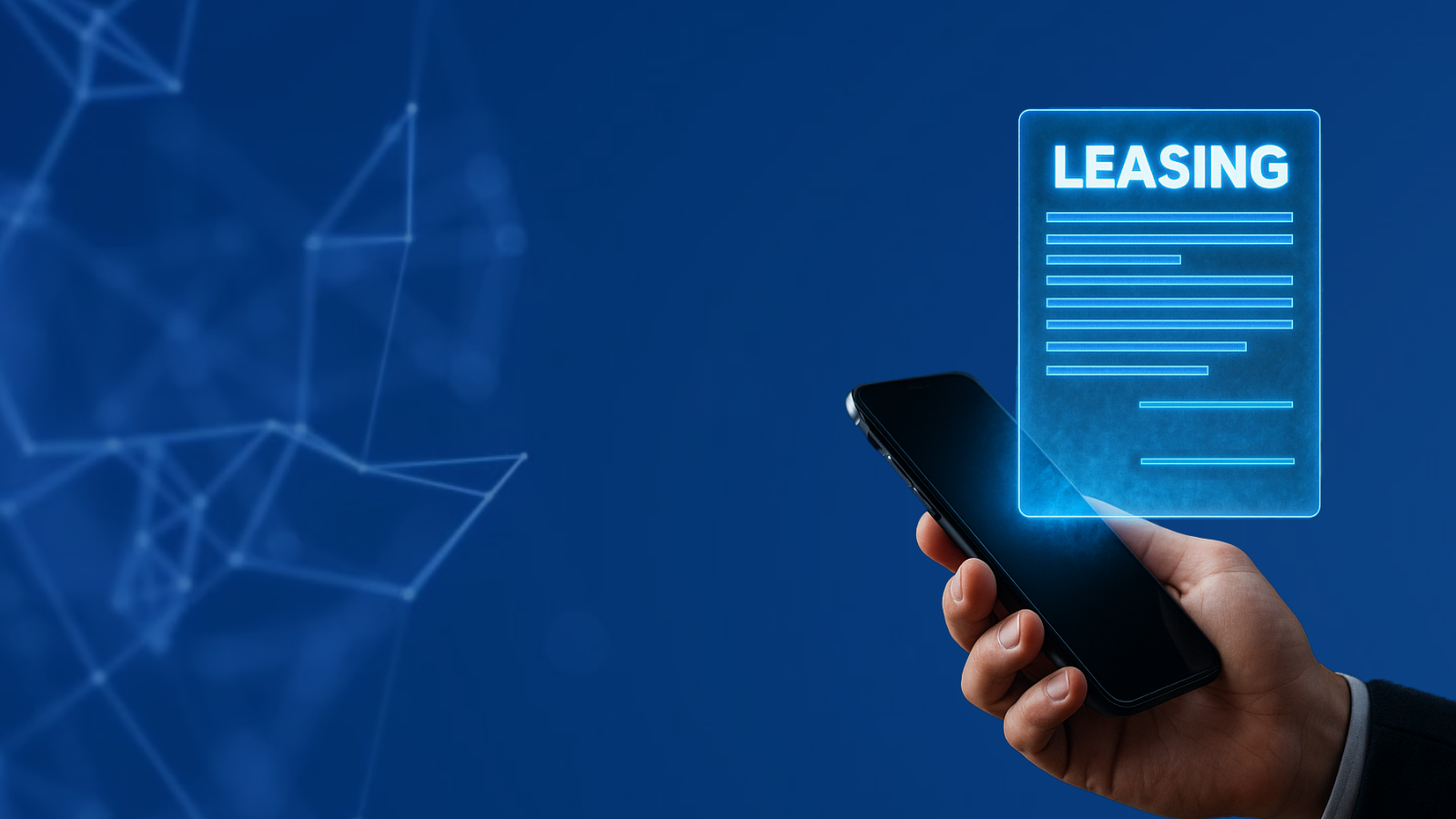Since cloud computing, AI, smart chatbots, and ML capabilities have been widely discussed by opinion leaders across various industries, it came as no surprise that their rapid development would soon affect the leasing sector. Lease companies, being mindful that automation is becoming more ingrained in our daily lives, seek solutions that will improve lessees’ experience, enhance customer service, and increase process transparency. In the following article, let’s take a look at trends and forecasts for the leasing sector, sharing insights on the market’s transformation and what opportunities and challenges may arise.
Table of Contents
- Major technologies driving digitalization: AI, Big Data, XaaS, IoT, blockchain, and more
- Mandatory ESG reporting: what does it mean for leasing?
- eCommerce growth & consumer habits impact on leasing
- Current communication channels in leasing: what lies ahead?
- Next-gen electronic customer service platforms: what’s on the horizon?
- Are you seeking insights into focal points for the leasing sector’s digital transformation success?
Major technologies driving digitalization: AI, Big Data, XaaS, IoT, blockchain, and more
Artificial Intelligence
The presence of AI-powered chatbots in the business landscape has been a hot topic lately, making us wonder if we are really witnessing a technological breakthrough or if it is just a result of the media hype around AI. Market opinions are divided. It’s important to keep in mind that whenever a new revolutionary technology is introduced, we need to remain cautious and make sure that we, as end users, will benefit from it. The tech solutions themselves are great, but apart from their advantages, they also have drawbacks and limitations.
As for conversational AI, and even more so for generative AI, someone unfamiliar with a specific issue may receive incomplete, confusing, or entirely incorrect responses if they don’t know how to formulate the right prompts, making it challenging to verify the accuracy of the generated outcomes. I would draw a parallel to the widespread use of early online translators, which sometimes led non-native speakers to share grammatically flawed text. Similarly, GPS navigation systems could cause experienced drivers to get lost despite their excellent route knowledge because they put too much faith in technology instead of their skills.
As a digression, ING Leasing Group recently announced that it has leased the first humanoid bot that will hold the role of Dictador’s experimental AI CEO. It’s a great example proving that today no one doubts anymore that the importance of new technologies in business will grow every year.
During this year’s Ailleron Innovation Forum, in his keynote speech, CEO Rafał Styczeń boldly likened the ongoing AI revolution to the impact of the mobile phone’s invention. He emphasized that with today’s rapid technological progress, AI adoption will occur at an accelerated pace, leading to substantial social and business transformations across diverse industries.
Despite the AI hype at its peak in the IT industry and the increased interest in finding AI applications for the financial sector, the European market, compared to the US, has significant progress to make before unlocking the full commercial potential of AI. Several factors affect it: European market regulations, particularly in the financial sector, stricter data protection legislation (GDPR), and the conservative nature of European financial institutions, which makes them followers rather than innovation pioneers. Many companies fail to address AI adoption comprehensively. They lack internal assessments or guidelines to inform employees about the level of support, permissible actions, or potential risks throughout various stages of AI development. There are no dedicated units, such as guilds, to handle AI-related matters.
Looking ahead, it will be crucial to carefully separate sensitive data from information that can be accessible to anyone without limitations. The adoption of AI is undoubtedly on the rise, but not as fast as some may have predicted, especially in a highly regulated financial sector. Banks and leasing companies may begin by implementing chatbots for internal purposes to mitigate the potential risk of customer data leaks. Collaborative cross-company efforts could minimize the chances of malpractice or incorrect AI solutions implementation for banking and leasing services, helping to safeguard customers from potential breaches.
One thing is for sure, to win the digital shift and maximize AI’s potential, the industry should adopt solutions that optimize the constantly limited time by automating routine and repetitive tasks. Specialists can then focus on assignments where AI complements rather than replaces human knowledge and experience.
Internet of Things
In the leasing industry, the Internet of Things is commonly applied, especially in transportation and production, where data from vehicles and machinery is systematically gathered and analyzed by manufacturers. Internet of Things also supports the pay-as-you-use payment model, in which the customer pays only for the actual use of a certain asset. IoT provides usage-based billing for machines and devices, fostering cost-efficiency and flexibility. Therefore, it’s not a prediction or a trend that is expected to shape the market landscape in the coming years but a currently used tech concept.
However, to take full advantage of the IoT capabilities, companies specializing in heavy transport vehicle leasing could make better use of data provided by manufacturers to anticipate maintenance, schedule service appointments, or forecast downtime. IoT also finds application in tailoring services for both lessees and end users of leased assets, supporting companies in offering additional services to improve asset efficiency and strengthening long-lasting partnerships with clients. Such services are common in the Western European market, with a strong customer trust culture, and actively lobbying for sharing economy.
The success of such IoT projects will largely depend on effective cooperation between the manufacturer and the leasing company financing the vehicle. More frequent IoT adoption in the leasing of construction, agricultural, and industrial machinery and equipment is highly likely to happen. Utilizing the gathered data effectively will not only benefit the manufacturer itself but also extend its benefits to various stakeholders, encompassing the end customer (lessee), the financier (leasing company), and the insurer. AI will undoubtedly play a significant role in supporting such services.
Cloud computing
The leasing industry is facing concerns related to the security of moving data to the cloud and centralized data management, typically supervised by in-house IT departments. Decision-makers need to acknowledge that legacy core leasing systems and their natural limitations are major challenges in the digital transformation of the leasing sector. Migrating these systems to the cloud will entail inherent project risks and additional costs. What may speak in favor of migration is the financial analytics development, which, after accurate calculations, may confirm that cloud adoption will bring long-term savings in energy, server maintenance, and hardware upgrades. It’s worth noting that achieving planned savings doesn’t happen immediately. The cloud’s cost dynamics are still not fully recognized. Migrations come with a significant risk of exceeding the initial budget, and optimizing performance is also a critical factor to keep in mind.
Large capital groups are already carrying out such migration projects. Over the next five years, more and more companies will be drawn to it due to the increasing pressure of moving to the cloud and the need for integration within a designated hub.
A critical aspect of navigating these transformations is ensuring the continuity of business service quality. Drawing from my experiences and observations, I note that the drive toward infrastructure centralization poses a substantial risk of diminishing business agility. Centralizing infrastructure in leasing or asset finance companies may strip away their edge in local connections and skillful customization of financial products to their customer’s specific needs, making them more akin to other market players. The challenge lies in preserving their distinctive value proposition while adapting to the digital shift.
Big Data
The shift towards cloud migration is closely related to streamlining Big Data processing. This trend is strongly supported by Ailleron, which offers big data management services, and building custom data funnels. I’d say that Big Data itself is not a trend per se. The future lies in making more efficient use of the data gathered within a company. The Western European leasing sector has a history spanning 30 to 60 years. Considering the long-standing market presence, we are talking about an enormous amount of data stored in various systems. This information, combined with years of industry experience, can be used efficiently for analytical purposes.
More than that, Big Data has the capability to support leasing companies in building new business models or estimating the residual value of assets solely by harnessing its own data resources without the need for external support. We still have a lot to learn in terms of leveraging the potential of the data we have at our fingertips. For example, leasing companies have collected information for many years about leased cars, how they were paid off, and what the final value of the vehicle was. With such in-depth insight, they could create a data funnel and turn their asset knowledge not only into risk analysis for specific items or customer segments but also into building new solutions. To do so, leasing companies would have to step outside their comfort zone in terms of intra-industry collaboration. As I mentioned above, when talking about IoT, leasing companies could profit more by jointly collaborating and exchanging industry insights to fully harness the potential inherent in the large data sets gathered from current assets.
Blockchain
The leasing market landscape varies depending on the country, as does the level of adoption of various technological solutions. When discussing blockchain, I will specifically refer to the characteristics of the Polish market.
Considering the needs of the Polish leasing market, unlocking the full potential of blockchain technology would be more achievable with an amendment to the 1936 Bills of Exchange Act. Then, it would be possible to transform the leasing process for a full range of assets. Due to outdated regulations, even when we digitalize the entire leasing process (with high-value leased items requiring a blank promissory note), customers will still be required to sign the promissory note in person. Primarily, it’s a challenge for legislators and, secondarily, for leasing companies. For lessors, it is crucial to use blockchain to facilitate document workflow since the lease agreement is the basis for providing the service. It’s just a matter of time until one industry leader gets ahead of the curve and the rest of the market players, driven by a successful case study, decide to implement their own blockchain-based solutions.
Mandatory ESG reporting: what does it mean for leasing?
The popularization of ESG frameworks will induce changes in consumer behavior. The more companies strive for carbon neutrality and less frequently fund carbon investments, the faster the market demand shifts. It’s crucial to introduce ESG guidelines without causing disruption to other ongoing projects, operations, and corporate investments.
Introducing EGS guidelines poses yet another challenge. Facilitating the progress of developing countries becomes difficult when lawmakers, through imposing rigorous regulations, inadvertently restrict market access for suppliers from these nations. Consequently, this impedes their development and exposes them to the influence of undemocratic authorities.
Our trajectory is leading towards a scenario where not only buildings must adhere to stringent standards, but also the machinery, equipment, and materials involved in construction must comply with ESG requirements. This prompts the crucial question of how developed nations can effectively support their partners in regions where non-financial reporting is not obligatory, guiding them without jeopardizing their business continuity. The foremost challenge lies not so much within the industry itself but rather in the economic realm.
The regulatory landscape introduces additional obligations set to take effect in 2024. Leasing companies will be required not only to meticulously report the environmental impact of the assets they utilize but also to extend this scrutiny to encompass their entire leasing portfolio. In the context of a single country, this task involves assessing hundreds of thousands of assets. Successfully navigating this challenge demands the adoption of a strategic approach involving collaboration not just within the leasing sector (as exemplified by emerging joint association initiatives in Poland) but also with manufacturers and suppliers of the financed equipment.
This collaborative effort will entail furnishing the necessary data and tools and facilitating seamless reporting to end customers. It marks a pivotal stride towards elevating corporate responsibility for environmental and societal repercussions, underlining the significance of addressing and disclosing the broader impact of leasing activities.
eCommerce growth & consumer habits impact on leasing
The market is overfilled with traditional sales channels and is now seeking digital solutions to meet the current lessees’ needs. Customers are not only looking for new contact channels but are checking online what other assets they can lease.
This applies not only to eCommerce, but customer expectations will evolve as a new generation of lessees is yet to come, and they’re used to online channels solely. The COVID-19 pandemic only accelerated this transformation. Leasing companies confirmed the tendency, as they waited several years for the transition that the lockdown pushed through in a few months.
In the chapter comparing digital and traditional channels of the ICAN Research study commissioned by Ailleron, we provide a more in-depth explanation. This section highlights five transformative phenomena shaping the landscape of the leasing industry in Poland.
To meet young clients’ needs, it’s worth entering new markets, not only offering leasing of excavators, cars, and production machinery but also smaller assets and lower-value consumer items, often referred to as small-ticket items. It implies a different kind of risk and an understanding that the equipment is difficult to recover and easily disposed of. In such cases, the leasing process is simplified and fully automated, for which eCommerce channels are a perfect fit. Given that passenger cars make up over 50% of the leased assets, it’s worth reconsidering the modernization of those processes. The development of eCommerce will eventually lead to the automation of standard processes, increasing flexibility and improving the customer journey. In the future, leasing companies may offer assets that were previously unavailable through online channels.
Current communication channels in leasing: what lies ahead?
What has changed over the past few years is the openness of customers to new contact channels. The omnichannel paradigm means that we can communicate with a consultant via video chat, mobile app, WhatsApp Messenger, Microsoft Teams, social media, and more. The phone itself has remained “a phone” by name only. Leasing companies should focus on adapting to the new tools and redirecting data from these channels to secure solutions such as LeaseTech Virtual Branch – an enterprise-class communication hub that supports agents’ daily work from any location. After all, the concern for data security should not burden the customer.
Next-gen electronic customer service platforms: what’s on the horizon?
The drive toward electronic banking continues under what we can already call “the new leasing approach”. The number of lessees is growing, with about 2.5 million businesses only in Poland, of which 900,000 are leasing customers. These values are too significant to be undervalued. As we increase automation in processes, their management becomes more streamlined, resulting in reduced overall service costs. Tech experts anticipate that Robotic Process Automation will play a pivotal role in this transition, as many leasing companies still operate on legacy systems, and the challenge lies in integrating these systems with modern tools to align with specific business logic.
Web customer service platforms and mobile apps are moving toward self-service solutions to be more accessible to every lessee, whether the client leases an excavator or a laptop. Customers require more than just the ability to browse invoices and make payments; they seek access to a broader range of services: additional financing, insurance, items bookings etc. For example, in Poland, all invoices will soon be processed electronically; that’s why we need to improve customer service platforms to deliver the best and quickest possible service to lessees.
The practices that have already become standard in consumer banking will also prove common in the leasing industry since the two sectors, in a way, go hand in hand. Both IT and leasing companies are facing an emerging question: how can we, as providers and owners of these platforms, encourage clients to use them more frequently? Furthermore, we must keep in mind the upcoming generation of leasing clients, who have distinct preferences and prioritize mobile devices as their primary choice. Given their diverse habits, the importance of designing an omnichannel leasing customer experience will be more crucial than ever before.

 Polski
Polski
 Deutsch
Deutsch






